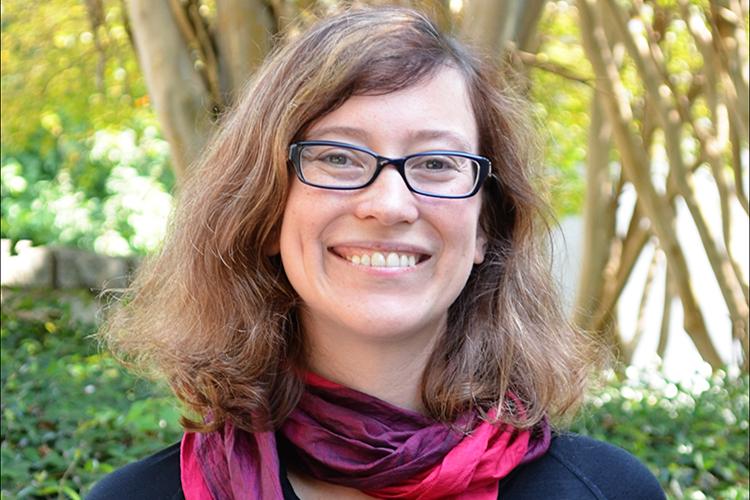TIJS Fellow to Defend Dissertation on the Intersection of Sustainability and Jewish Identity

Like so many other doctoral candidates, Lisa Portilla will be defending her dissertation in Spring 2021 via Zoom. Portilla, a student in the Graduate Division of Religion (GDR) whose research focuses on American Jewish approaches to environmentalism, currently resides in Colorado, over a thousand miles away from the faculty who will be listening to her defense here in Atlanta. “It would have been nice to defend in person at Emory, in the seminar rooms where so many ideas unfolded and with the people who contributed so much to my understanding of American Jewish history, religious practices, and the intersection of religion and ecology,” she said. Still, she is grateful that technology has made it possible to continue her graduate career in the midst of a global pandemic.
Portilla hails originally from LaSalle, Illinois, and earned her B.A. in philosophy and international studies from Illinois Wesleyan University. She began researching her primary interest, sustainability, at the University of Minnesota, where she earned her master’s degree. Her work experience in several different synagogues led her to choose a doctoral program in religious studies rather than in philosophy. Despite her sojourn from academia, Portilla says, “I still had many of the same ethical questions centered on community, the environment, and identity, but because of my work I was now considering them in a Jewish context.”
She also earned a graduate certificate in Jewish Studies from the Graduate Theological Union in preparation for her doctoral program in the GDR. She chose Emory for its strength in Jewish studies and ethics, and she also appreciated the multiplicity of religious perspectives found at the university. “Emory was a great fit in that regard, and ultimately pushed me in directions I hadn’t considered. The religious practices and practical theology concentration, for example, moved my work in directions I could not have predicted based on my previous academic experience in philosophy,” Portilla says.
Stemming from her interest in the role religion plays in social movements, her dissertation explores how individuals, organizations, and movements within the American Jewish community create and perpetuate origin stories, biographies, and collective identities that shape the ways in which they frame and respond to climate change. A member of her dissertation committee, Prof. Bobbi Patterson, praises Portilla’s work as helping to locate the strong and now rising commitments of Jewish communities to earth care work linked to Jewish identity and practice. “As an interdisciplinary dissertation, Lisa’s approach offers a wide range of readers a doorway into a complex topic through histories of Jewish movements and social action, educational curricula, foodways, worship practices, and more.”
Prof. Jonathan Crane, another member of her committee, concurs, adding, “Her work also demonstrates the importance and potency of interdisciplinarity that weaves together different modes of investigation to contend with such issues as identity, sustainability, and justice.”
During her time at Emory, Portilla received grants from the Tam Institute for Jewish Studies, which enabled her to spend two summers in Israel, where she engaged in intensive modern Hebrew language training and a rigorous program of havruta learning (small-group study of Talmudic texts). She even took a 40-hour intensive course on kashrut (the Jewish dietary laws) and received a basic certification as a mashgichah (kashrut supervisor) from the Jewish Theological Seminary’s branch in Israel. She says her time abroad enabled her to develop connections, shadow Israeli ecologists in the field, volunteer weekly at the Nature Museum’s community garden, and have researchers guide her through some of the private and national wildlife reserves. Portilla says, “These experiences provided a rich backdrop for my research on American Jewish environmentalism and allowed me to place my studies in context.”
As for her post-graduation plans, Portilla is open to many possibilities. “I love teaching, but I also loved serving as managing editor for Practical Matters: A Journal of Religious Practices and Practical Theology during my time at Emory. Based on that experience and my work prior to my doctorate, I am open to finding a position in something academic-adjacent while continuing to apply to faculty positions.” Portilla maintains that regardless of where she lands, she plans on furthering her research on the role contemporary American religions play in social movements as well as the ways in which religion and ecology intersect.
“I will say that in addition to my studies, my favorite moments have consistently been the conversations with rabbis, authors, researchers, university presidents, activists, and diplomats around the Shabbat dinner table. For all of this, I am exceedingly grateful to the Tam Institute for helping to make my research travel possible,” she says. Portilla would also like to thank Profs. Bobbi Patterson, Don Seeman, Eric Goldstein, and Jonathan Crane, along with so many other Emory faculty members and students, for their support and invaluable perspectives.
Published 2/23/2021